Saints of the Day
 |
 |
 |
 |
 |
 |
 |
Feast of St. Gabriel - March 24
Gabriel is one of the first of the Angelic Kingdom. He tells Zachary that he stands before the face of God. (Lk 1:19) He is the Angel of the Incarnation, because it is in this mystery, which apparently is so humble, that the power of God is principally manifested. And Gabriel signifies the strength of God.
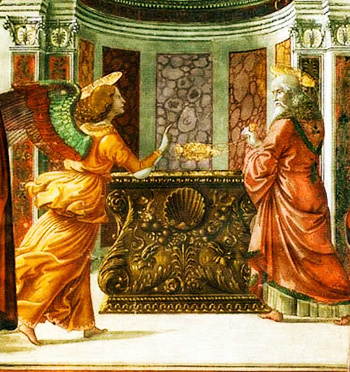 We find the Archangel preparing for this sublime office, even in the Old Testament. First of all, he appeared to Daniel, after this Prophet had had the vision of the Persian and Grecian Empires; and such was the majesty of his person that Daniel fell on his face trembling. (Dan 8:17)
We find the Archangel preparing for this sublime office, even in the Old Testament. First of all, he appeared to Daniel, after this Prophet had had the vision of the Persian and Grecian Empires; and such was the majesty of his person that Daniel fell on his face trembling. (Dan 8:17)
Shortly afterwards, he appeared again to the same Prophet, telling him the exact time of the coming of the Messiah: “Know thou and take notice: that from the going forth of the word to build up Jerusalem again, unto Christ the Prince, there shall be seven weeks and sixty-two weeks,” (Dan 9: 25) that is, 69 weeks of years.
When the fullness of time had come, Heaven was to send the last of the Prophets, John the Baptist, who, after preaching to men the approach of the Messiah, would show Him to the people, saying: 'Behold the Lamb of God, Who taketh away the sins of the world.' Then did Gabriel descend from Heaven to the Temple of Jerusalem, and prophesy to Zachary the birth of John the Baptist (Lk 1:13), which was to be followed by the birth of Jesus Christ Himself.
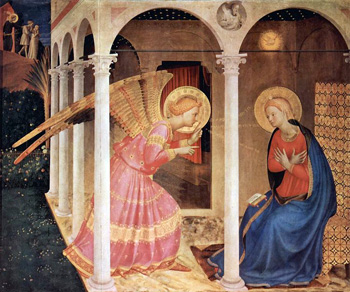 Six months later, the holy Archangel again appears on the earth; and this time it is Nazareth that he visits. He brings the great message from Heaven. Angel as he is, he reveres the humble Maid, whose name is Mary. He has been sent to her by the Most High God, to offer her the immense honor of becoming the Mother of the Eternal Word.
Six months later, the holy Archangel again appears on the earth; and this time it is Nazareth that he visits. He brings the great message from Heaven. Angel as he is, he reveres the humble Maid, whose name is Mary. He has been sent to her by the Most High God, to offer her the immense honor of becoming the Mother of the Eternal Word.
It is Gabriel that receives the great Fiat, the consent of Mary; and when he quits this earth, he leaves it in possession of Him, for Whom it had so long prayed in those words of Isaiah: Drop down Dew, ye Heavens from above, and let the clouds rain the just. Let the earth be opened and bud forth a Savior, and let justice spring up. (Is. 14:8)
The hour at length came, when the Mother of the Emmanuel was to bring forth the blessed Fruit of her virginal womb. Jesus was born amidst poverty; but Heaven willed that His crib should be surrounded by fervent adorers.
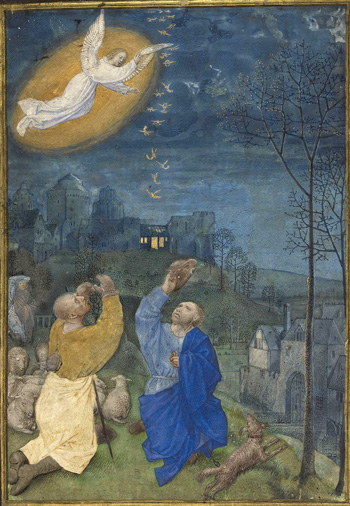 An Angel appeared to some shepherds, inviting them to go to the stable near Bethlehem. He is accompanied by a multitude of the Heavenly Army, sweetly singing their hymn: “Glory to God in the highest, and on earth peace to men of good will!”
An Angel appeared to some shepherds, inviting them to go to the stable near Bethlehem. He is accompanied by a multitude of the Heavenly Army, sweetly singing their hymn: “Glory to God in the highest, and on earth peace to men of good will!”
Who is this Angel who speaks to the shepherds, and seems as the Chief of the other Blessed Spirits that are with him? In the opinion of several learned writers, he is the Archangel Gabriel, who is continuing his ministry as messenger of the good tidings. (Lk 2:10)
Lastly, when Jesus is suffering His agony in the Garden of Gethsemani, an Angel appears to Him, not merely as a witness of His sufferings, but that he might strengthen Christ under the fear His Human Nature felt at the thought of the chalice of the Passion He was about to drink. (Ibid. 22: 42-43)
Who is this Angel? He is Gabriel, as we learn not only from the writings of several holy and learned authors, but also from a hymn which the Holy See has permitted to be used in the liturgy, and which we give below.
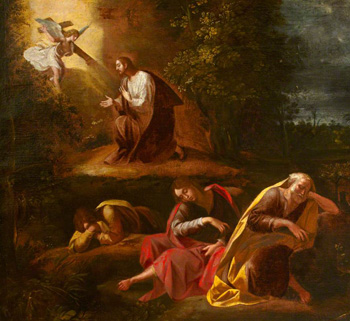 These are the claims of the great Archangel to our veneration and love. These are the proofs he gives of his worth to bear his beautiful name, the strength of God. God has employed him in each stage of the great work in which He has chiefly manifested His power. For Jesus, even on His Cross, is the Power of God, (1 Cor 1:24) as the Apostle tells us.
These are the claims of the great Archangel to our veneration and love. These are the proofs he gives of his worth to bear his beautiful name, the strength of God. God has employed him in each stage of the great work in which He has chiefly manifested His power. For Jesus, even on His Cross, is the Power of God, (1 Cor 1:24) as the Apostle tells us.
Gabriel prepares the way for Jesus. He foretells the precise time of His coming. He announces the birth of His Precursor. He is present at the solemn moment when the Word is made Flesh. He invites the shepherds of Bethlehem to come to the crib and adore the Divine Infant. And when Jesus, in His agony, is to receive strength from one of His own creatures, Gabriel is found ready in the Garden of Gethsemani, as he had been at Nazareth and Bethlehem.
Let us, then, honor the Angel of the Incarnation. The following hymn is from the old Franciscan Breviary:
'Tis Gabriel that Comes
Let us all exult with joyous hearts
And strike the tuneful lyre;
'Tis the great Gabriel that comes
In all his brightness from the high heavens.
This is the feast of the glorious Virgin's messenger,
And with him comes the whole host of Angels,
Singing in varied hymns
The praise of Christ.
Let our choir, therefore,
Sing the praises of Gabriel the Prince,
For he is one of the seven that stand
Before the Lord and do His biddings.
Gabriel cheerfully descends whithersoever God wills,
For he is the Messenger of Heaven.
Nay, the mediator that reveals to the world
The secret decrees of the omnipotent God.
Be thou, O Gabriel, we beseech thee,
Messenger to us of the special gift of eternal peace,
Wherewith we may finally reach Heaven,
And everlastingly rejoice.
May the Godhead ever blessed of
Father, Son and Holy Ghost,
Whose glory is proclaimed through the whole world,
Grant us this our prayer. Amen.
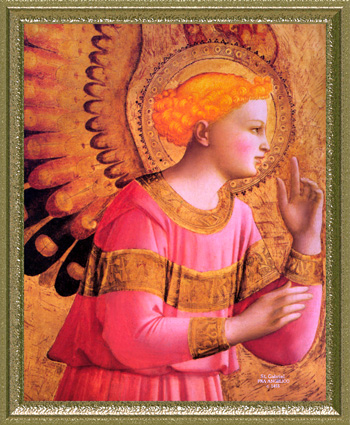
Adapted from Dom Guéranger, The Litugical Year, Feast of St. Gabriel - March 24

See the Annunciation


The Archangel Gabriel appears to Zachary
Shortly afterwards, he appeared again to the same Prophet, telling him the exact time of the coming of the Messiah: “Know thou and take notice: that from the going forth of the word to build up Jerusalem again, unto Christ the Prince, there shall be seven weeks and sixty-two weeks,” (Dan 9: 25) that is, 69 weeks of years.
When the fullness of time had come, Heaven was to send the last of the Prophets, John the Baptist, who, after preaching to men the approach of the Messiah, would show Him to the people, saying: 'Behold the Lamb of God, Who taketh away the sins of the world.' Then did Gabriel descend from Heaven to the Temple of Jerusalem, and prophesy to Zachary the birth of John the Baptist (Lk 1:13), which was to be followed by the birth of Jesus Christ Himself.

The Messenger comes to Our Lady & asks her to be the Mother of God
It is Gabriel that receives the great Fiat, the consent of Mary; and when he quits this earth, he leaves it in possession of Him, for Whom it had so long prayed in those words of Isaiah: Drop down Dew, ye Heavens from above, and let the clouds rain the just. Let the earth be opened and bud forth a Savior, and let justice spring up. (Is. 14:8)
The hour at length came, when the Mother of the Emmanuel was to bring forth the blessed Fruit of her virginal womb. Jesus was born amidst poverty; but Heaven willed that His crib should be surrounded by fervent adorers.

The Archangel, leader of the heavenly hosts that invited the shepherds to adore the Newborn Christ
Who is this Angel who speaks to the shepherds, and seems as the Chief of the other Blessed Spirits that are with him? In the opinion of several learned writers, he is the Archangel Gabriel, who is continuing his ministry as messenger of the good tidings. (Lk 2:10)
Lastly, when Jesus is suffering His agony in the Garden of Gethsemani, an Angel appears to Him, not merely as a witness of His sufferings, but that he might strengthen Christ under the fear His Human Nature felt at the thought of the chalice of the Passion He was about to drink. (Ibid. 22: 42-43)
Who is this Angel? He is Gabriel, as we learn not only from the writings of several holy and learned authors, but also from a hymn which the Holy See has permitted to be used in the liturgy, and which we give below.

St. Gabriel comes to comfort Christ
in the Garden of Gethsemani
Gabriel prepares the way for Jesus. He foretells the precise time of His coming. He announces the birth of His Precursor. He is present at the solemn moment when the Word is made Flesh. He invites the shepherds of Bethlehem to come to the crib and adore the Divine Infant. And when Jesus, in His agony, is to receive strength from one of His own creatures, Gabriel is found ready in the Garden of Gethsemani, as he had been at Nazareth and Bethlehem.
Let us, then, honor the Angel of the Incarnation. The following hymn is from the old Franciscan Breviary:
Let us all exult with joyous hearts
And strike the tuneful lyre;
'Tis the great Gabriel that comes
In all his brightness from the high heavens.
This is the feast of the glorious Virgin's messenger,
And with him comes the whole host of Angels,
Singing in varied hymns
The praise of Christ.
Let our choir, therefore,
Sing the praises of Gabriel the Prince,
For he is one of the seven that stand
Before the Lord and do His biddings.
Gabriel cheerfully descends whithersoever God wills,
For he is the Messenger of Heaven.
Nay, the mediator that reveals to the world
The secret decrees of the omnipotent God.
Be thou, O Gabriel, we beseech thee,
Messenger to us of the special gift of eternal peace,
Wherewith we may finally reach Heaven,
And everlastingly rejoice.
May the Godhead ever blessed of
Father, Son and Holy Ghost,
Whose glory is proclaimed through the whole world,
Grant us this our prayer. Amen.

St. Gabriel, Messenger of Christ’s Coming
Adapted from Dom Guéranger, The Litugical Year, Feast of St. Gabriel - March 24

 | |
|
|
The texts of both the biographical data and the comments come from personal notes taken by Atila S. Guimarães from 1964 to 1995. Given the fact that the source is a personal notebook, it is possible that at times the biographic notes transcribed here will not rigorously follow the original text read by Prof. Plinio. The commentaries have also been adapted and translated for TIA’s site.


